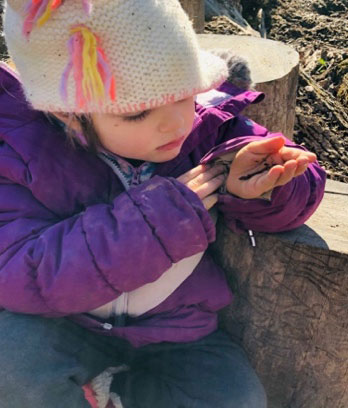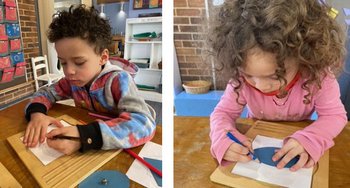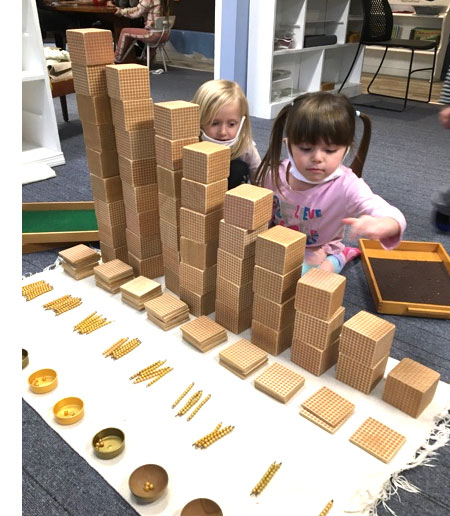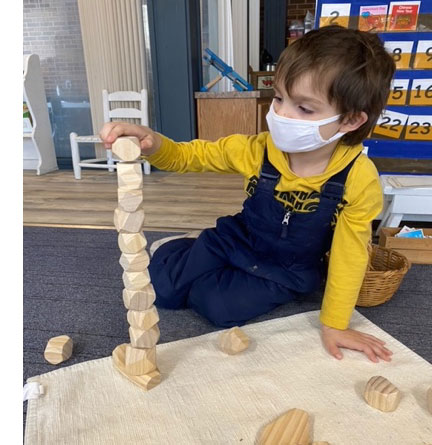 Hidden deep inside the budding spirit of every child are 8 embryonic “seeds”. When prompted by the stimuli embedded in a nurturing environment, these seeds germintate and give rise to the child’s early psychic development. Scientist and educator, Maria Montessori, observed that the human species has a double embryonic life: the physical embryo unfolds within the mother's womb and the embriologia spirituale (or psychic embyo) which burgeons forth during the first three critical years of life when the infant brain fleshes out her genetic blueprint. Montessori likens the work of the newborn's cognitive development to the physical work of the embryo. Driven by her innate curiosity and impulse to learn, the infant toddler quickly acquires her native language & culture. The unfolding of the embryonic “seed” – empowers and guides the young child’s abilitiy to survive and thrive in the world.
Hidden deep inside the budding spirit of every child are 8 embryonic “seeds”. When prompted by the stimuli embedded in a nurturing environment, these seeds germintate and give rise to the child’s early psychic development. Scientist and educator, Maria Montessori, observed that the human species has a double embryonic life: the physical embryo unfolds within the mother's womb and the embriologia spirituale (or psychic embyo) which burgeons forth during the first three critical years of life when the infant brain fleshes out her genetic blueprint. Montessori likens the work of the newborn's cognitive development to the physical work of the embryo. Driven by her innate curiosity and impulse to learn, the infant toddler quickly acquires her native language & culture. The unfolding of the embryonic “seed” – empowers and guides the young child’s abilitiy to survive and thrive in the world.


1. THE URGE TO EXPLORE & INVESTIGATE : The “seed” of the child’s inquisitive spirit engenders an unfolding desire to fully experience her new world.
2. MAXIMAL ENERGY: The spirited “seed” of natural zest precipitates an impetus to confront challenges with maximal effort as the child pursues areas of interest and eagerly learn to perfect their skills.
 3. SELF-PACE THROUGH REPETITION: The “seed” of relentless fascination drives the next phase of development: the urge to master the task at hand through repeated effort at her own pace. Achieving mastery through independent trial and error empowers the child to strive further and fulfill her inborn potential.
3. SELF-PACE THROUGH REPETITION: The “seed” of relentless fascination drives the next phase of development: the urge to master the task at hand through repeated effort at her own pace. Achieving mastery through independent trial and error empowers the child to strive further and fulfill her inborn potential.
 4. SELF SUFFICIENCY: Nightingale’s prepared learning environment stimulates the child's inward craving for self-reliance and nurtures the “seed” of independent learning by providing opportunities to be resourceful and inventive.
4. SELF SUFFICIENCY: Nightingale’s prepared learning environment stimulates the child's inward craving for self-reliance and nurtures the “seed” of independent learning by providing opportunities to be resourceful and inventive.
 5. PERCEPTION OF ORDER AND HIGHER ORDER THINKING: The natural capacity to perceive patterns and relationships between categories is a “seed” that, when cultivated, informs critical reasoning and engages higher order thinking. The discovery of the underlying logic that governs correspondences between concrete objects and abstract representations empowers the “mathematical mind” and the capacity to decode and encode language. Understanding the basic principles of order minimizes reliance on rote memorization.
5. PERCEPTION OF ORDER AND HIGHER ORDER THINKING: The natural capacity to perceive patterns and relationships between categories is a “seed” that, when cultivated, informs critical reasoning and engages higher order thinking. The discovery of the underlying logic that governs correspondences between concrete objects and abstract representations empowers the “mathematical mind” and the capacity to decode and encode language. Understanding the basic principles of order minimizes reliance on rote memorization.
 6. EAGERNESS TO ADAPT & CREATE: The internal sense of order and development of higher order thinking empowers problem solving skills, a trait that is foundational to creative thinking. The child enjoys inventing and constructing new imaginative forms based on hands-on experience.
6. EAGERNESS TO ADAPT & CREATE: The internal sense of order and development of higher order thinking empowers problem solving skills, a trait that is foundational to creative thinking. The child enjoys inventing and constructing new imaginative forms based on hands-on experience.
 7. AESTHETIC SENSE: The natural love of order and beauty he enjoys with his five senses stimulates his sensorial experience, his motor and emotional sensibilities. This in turn kindles a desire to imagine and recreate that beauty and satisfaction in his own work.
7. AESTHETIC SENSE: The natural love of order and beauty he enjoys with his five senses stimulates his sensorial experience, his motor and emotional sensibilities. This in turn kindles a desire to imagine and recreate that beauty and satisfaction in his own work.

8. ABSORBENT MIND: In the formative years of every toddler there is a unique sensitivity to her environment that leads her to observe and subconsciously absorb and internalise lessons from her surroundings so she can adapt to life. This “psychic embryo” is the most significant phase of learning in the life of a human being. It shapes her learning and her ability to assimilate the customs and language of her culture. If we fulfill the potential of each child, we can more fully realize the potential of the human race.